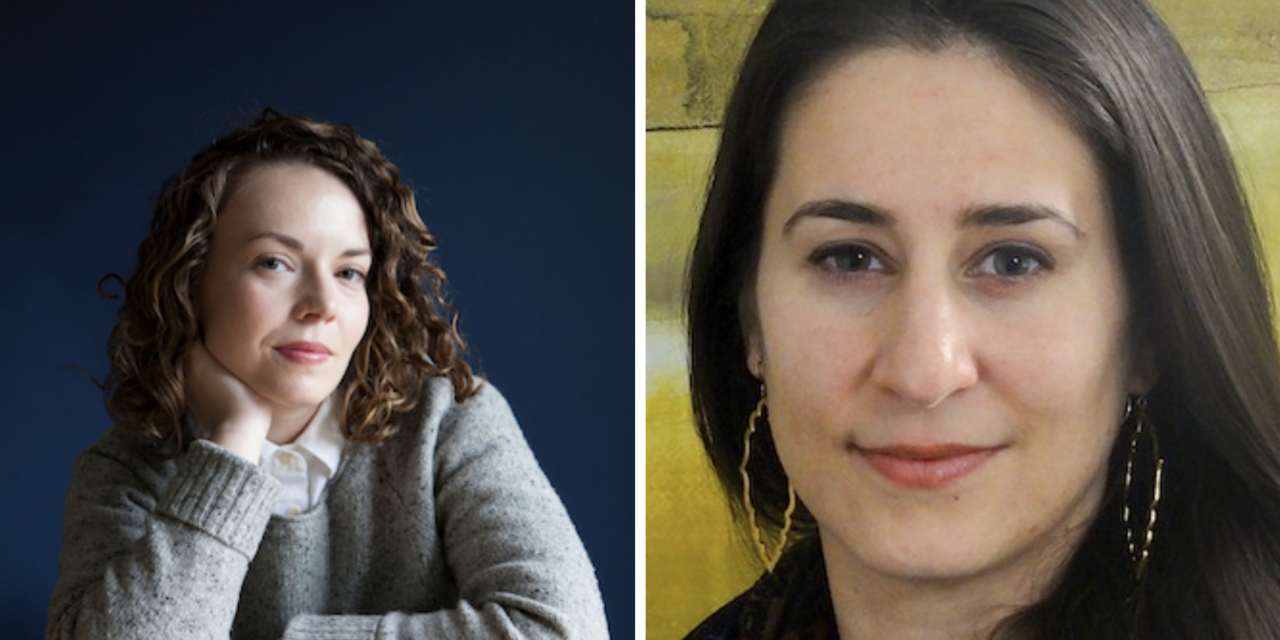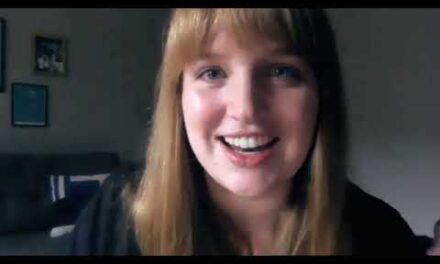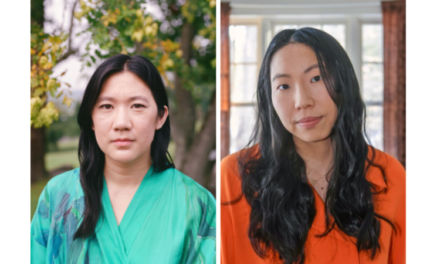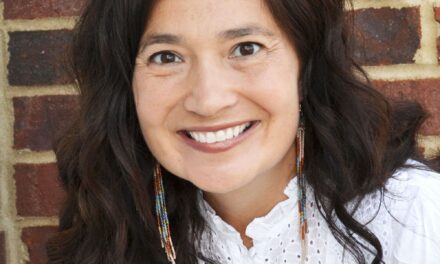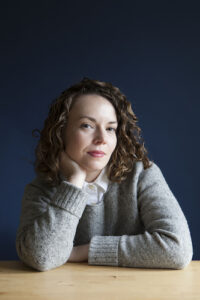
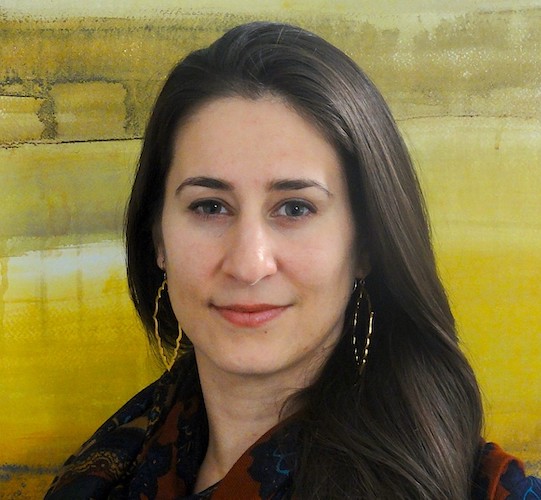
Assistant Editor Haley Crigger: The Robert and Adele Schiff Fiction Festival kicked off yesterday with two incredible readings by Gwen Kirby and Liv Stratman, two certified geniuses who are somehow just as compelling in person as they are on the page. Today’s events, held in the Elliston Poetry Room, include a panel with Kirby, Stratman, Winter, and Peynado at 2 p.m., and a reading from Bess Winter and Brenda Peynado at 5:30. (If you’d like to tune in remotely to either event, you can also register via Zoom!)
As accomplished authors and graduates of UC’s creative writing doctoral program, these writers are uniquely familiar with the creative life in all its forms: a solitary practice, an academic field, a community, an industry, an impulse. Over email, I asked them how they wade these waters and continue to forge a sense of artistic purpose:
In a society that often undervalues art, institutional support is crucial to any artist’s development and success. Fiction writers may find this in the form of artist’s grants, MFA programs, and / or residencies. In describing the formation of her book, Bess Winter mentioned that Michael Griffith’s full investment in her academic interests provided her the “seriousness of purpose and validation” she needed while pursuing her PhD at UC.
That got me thinking about writers’ other sources of validation. When external support is less consistent, where do you find that seriousness of purpose? How do you find it? What convictions, rituals, people, or places do you turn to?
Winter: That is such a good question, especially during a time when institutional support is being cut off, in some cases thanks to budget cuts, the whims of our elected officials, board members, and other people in suits.
To be honest, I had a very hard time getting Machines of Another Era published, which taught me a lot about finding the kind of support that isn’t material, but mental. I had what could probably be called a “bad experience” with an agent, which left me without a lot of options for submitting the MSS once I chose to leave that person’s stable of authors. The biggest source of support for me, since then, has been internal. When I was younger I saw writing and publishing as a zero-sum game. You were “successful” if you met certain benchmarks (published by a major press or an indie based in Minneapolis, the recipient of this or that award or fellowship, etc.), and you were a failure otherwise. In retrospect, that viewpoint was not only immature but a recipe for a total crash. I crashed. It didn’t compute, to me, that this work I’d put so much of myself into and that I believed, in my heart, was good—which had been published in journals I’d dreamed about since I was a teen and won the awards that were supposed to make me A Happy Person but (surprise!) didn’t—wasn’t good enough. It felt like the choice was to give up altogether or find a completely new way of being a writer.
I found renewed purpose once I came to see publishing as separate from, if not the opposite of, writing and making art. Publishing is a business; the publishing industry, if we’re talking publishers that intend to make money, is run by business people and number crunchers. I’m not saying major press books are bad (or that making money is bad). There are many excellent major press books. There’s also a lot of algorithmically approved garbage published by the big five (four?). Most heartbreaking might be the brilliant big press books that don’t get the marketing and publicity support they deserve and, as a result, get drowned out in all the noise. Big publishing is a fundamentally neoliberal industry in that it combines the brutal capitalism of Amazon with the moral certitude of a yard sign. It doesn’t actually care about writers. And the danger of basing your idea of artistic success on the approval of a capitalistic industry is that it can choke off your creativity and make you feel like you must write for the number crunchers.
So I learned I couldn’t count on the prospect of publishing to spur my creativity. I’d started writing because I was a lonely child who tried to build her own world. That’s what I had to go back to. I had to write to build my own world, with the idea that this world was not only good enough but worth sharing with an ideal reader, who may or may not be an extraterrestrial who stumbles across the charred remains of a manuscript in the year 3000. When institutions and places you see as the establishment tell you your work is not good enough—but you have a strong feeling in your heart that it is—question those institutions. As the excellent, and once-undervalued, Raptors point guard Fred VanVleet would say: Bet on yourself.
Some more tangible forces that got me there and may help others: good used bookstores, whose inventories aren’t dictated by publishing reps and whose shelves are ample enough to contain a wide representation of voices and authors across subjects and time periods. Really learning about outsider art and letting the extraordinary circumstances of those artists teach and inspire me (Intuit Gallery in Chicago was a haven for me, especially the Henry Darger Room). That one person who believes in me—in my case it’s my husband, Woody Skinner, who’s also a writer and UC alum, and without whom I wouldn’t know a single word that had ever left Fred VanVleet’s mouth. I also recommend keeping at least one Basset Hound around you at all times.
Peynado: I had a particularly dark time right after my MFA when I was working two minimum wage jobs back to back. I was often standing for eighteen hours a day, rushing from one job to the other, made it home with barely enough time to sleep and start it all over again. I remember crawling into my apartment because my feet hurt so much I couldn’t walk and thinking, I’ll never be a writer. I don’t have time to be a writer. I’m in a hole and I can’t see a way out. Tomorrow is never going to come. I sobbed. But it was exactly the break I needed. I realized that if I was going to have to wait until this promised tomorrow, when I would have time to write, be well-rested, get a grant or something that could afford me the time, it’s true that I would never be a writer. So I made a pact with myself that if tomorrow wasn’t going to come, then I had to make it happen today, under any conditions. So I would take a bathroom break and write stories on my phone with my thumb for five minutes at a time. I’d storydream when I was supposed to be stocking shelves. I used voice-to-text to babble while I was speeding to work. And I ended up being prolific. That pact is something I remind myself of when I can. It’s not about being a writer tomorrow when the conditions are right. It’s about being a writer today, when you have no right being a writer, because you say so.
I would also say that it takes writing with joy to write all those hours when you couldn’t be doing anything else. I spent a while in my MFA writing things that didn’t bring me joy because I thought I was supposed to write a particular way. It wasn’t until I graduated and I had that psychological break that I started pursuing writing as something that brought me joy. My characters started flying, believing in magic, launching themselves into the air. Suddenly I didn’t need rituals, space, or the right conditions to sustain my writing . . . my writing sustained me instead. I think there are a lot of people who write because they like the idea of being a writer, but writing down sentences is a toil for them. I don’t think those people write very much. There’s so much else to life to do instead. But if you view writing as pursuing your joy, you’ll want to do it, even while the baby is napping, even while you could be sleeping, even when you could be going out to dinner. (But sleeping is important too!) I don’t think joy is something you can force. It happens for some people, and it doesn’t happen for others. Who can control what makes us happy? And if it’s not writing, then do something else that at least pays well!
I also married another writer, and one of the things that brings us joy is worldbuilding and plotting together. Our house is like a mini writers room for our projects. We love throwing out ideas for worlds, layering them, building characters out of them together. Our validation is the delight on each other’s faces. I don’t think “Marry another writer” is great advice for sustaining a writing life, but it works for us.
Bess Winter has written on the topics of: dolls, mummies, taxidermy, death, horse tails, stolen eggs, Victorians, primates, private school girls, daguerreotypes, gas leaks, etc. Her work appears in Kenyon Review, American Short Fiction, Gettysburg Review, Alaska Quarterly Review, Ecotone, W.W. Norton’s Flash Fiction International, and elsewhere, and has been awarded a Pushcart Prize and the American Short[er] Fiction Prize. She’s received fellowships and scholarships from the Corporation of Yaddo, the Canada Council for the Arts, and the Sewanee Writers’ Conference. She grew up in Toronto, Canada. She has taught creative writing to kids, teens, and adults at StoryStudio Chicago, WordPlay Cincinnati, and elsewhere. Her debut collection, Machines of Another Era, was released by Gold Wake Press in 2021.
Brenda Peynado‘s genre-bending short story collection, The Rock Eaters—featuring alien arrivals, angels falling from rooftops, virtual reality, and sorrows manifesting as tumorous stones—garnered starred reviews from Publisher’s Weekly and Kirkus Reviews, and was named one of NPR, the New York Public Library, and Electric Literature’s best books of the year. Her stories have won an O. Henry Prize, a Pushcart Prize, the Chicago Tribune‘s Nelson Algren Award, and inclusion in The Best American Science Fiction and Fantasy, and over forty other short stories have appeared in places such as Tor.com, Georgia Review, The Sun, Southern Review, and Epoch. She teaches creative writing at the University of Houston.

